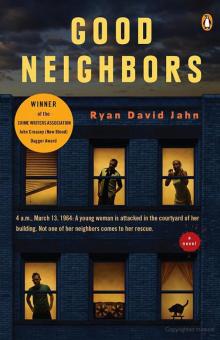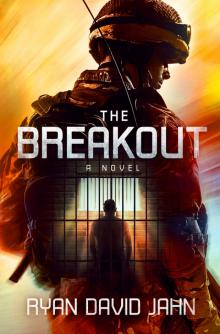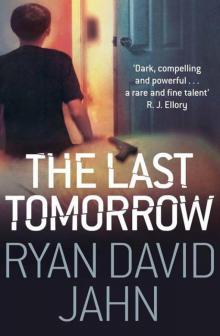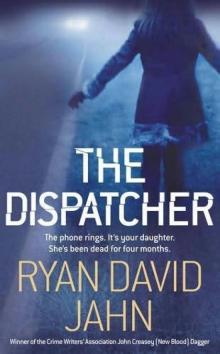- Home
- Ryan David Jahn
Good Neighbors Page 17
Good Neighbors Read online
Page 17
43
Frank is in the front passenger seat of the police cruiser, looking through the spotted glass of the window, clenching and unclenching his jaw and just wanting to be away from this motherfucker.
‘It wasn’t personal,’ Kees says, breaking the silence.
‘It wasn’t personal to you. It was pretty goddamn personal to me. You tried to put me in prison. Would have ruined not only my life, but my wife’s. And I happen to love my wife.’
‘Just doing what I had to do.’
‘Oh, bullshit.’
‘You don’t know what I go through.’
‘Well, let’s all shed a fucking tear for the homicidal policeman,’ Frank says, laughing angrily. ‘I don’t know what you go through? I don’t need to know. I know you tried to kill a man and your boss just lickity-split cleaned up an attempted murder with some of the department’s petty cash. I don’t know what you go through? Motherfucker, you’re the one that don’t live in reality. You got that blue on, it’s like a shield. The rest of us gotta walk through the city naked.’
‘This uniform isn’t a shield,’ Alan says, shaking his head. ‘It’s a target.’
‘Maybe it’s not the uniform that’s the target. Maybe it’s you. In fact, I’m fucking sure of it.’
Frank is breathing hard now and his cheeks feel hot and his hands are balled into fists. He’s as angry as he can remember being. He can feel the tendons tight in his arms. Tight with tension. And in his neck. And he feels a throbbing in his temples. He’s more than just angry at the cop sitting next to him; he’s angry at the world that has allowed him to exist, that has encouraged his existence. No wonder he can walk around with that second lieutenant smirk on his face doing whatever the hell he goddamn pleases – the world is made for assholes like him. Frank has always believed that people like him get what they deserve in the end but he doesn’t believe that anymore. Not now, not ever again. He unballs his fists and balls them up again. He feels an ache in his tight knuckles, a spring-loaded tension in his forearms.
‘If you weren’t wearing that uniform I would fuck you up for what you tried to do to me.’
As the words leave Frank’s mouth, Kees turns the wheel to the right and brings the cruiser to a stop by the curbside in front of the Hobart Apartments.
He looks at Frank and smiles.
‘Then why don’t we just pretend I’m not wearing the uniform, Frank?’
‘For the same reason I don’t pretend the ground is made out of marshmallows and jump off buildings. I don’t need reality slamming me in the face. The world hits you hard enough when you take it for what it is.’
Kees licks his lips, doesn’t look away from him.
‘I won’t tell if you don’t.’
Frank knows he’s bluffing, knows it because he’s wearing that goddamn second lieutenant smirk that Frank grew to hate during his two years in the army. He knows Kees is daring him simply to anger him, simply to make him feel small, because he knows Frank wouldn’t dare.
‘You want to take a swing at me, do it. You’re just a nigger to me, and there’s nothing you can do or say to make me change my mind about that. So take your swing. This is your chance.’
Frank’s right eye twitches with tension.
Kees’s smirk turns into a smile which shows his teeth. His eyes say he knows Frank won’t do it no matter how much he wants to, no matter how much he can taste it – and he can taste it, like blood, in the back of his mouth, coppery and bitter.
‘I’ve been through too much tonight,’ Frank says through gritted teeth. ‘Don’t tempt me.’
‘That’s why the Negro will never move forward. You’re all cowards. You’re a born slave—’
But before the cocky motherfucker who knows he’ll never get hit hard by the world can get the last word out, Frank’s shoulder is in his chest, knocking him back against the police cruiser’s door, and Frank hears an oof! as the air is forced out of his lungs and hears the crunch of the window roller snapping off as Kees’s back slams into it and the hollow thud of his head slamming against the water-spotted window. And then the door swings open – Kees must’ve accidentally pulled on the handle as he tried to push himself off the door – and the two men fall out onto the asphalt, Kees on his back, Frank on top of him, staring down at this stupid son of a bitch who thinks the world will never touch him. Frank grabs the guy by the hair and slams his head against the asphalt, and there’s an ugly hollow thud, but Frank barely hears it.
‘Am I a coward now, you son of a bitch?’
He slams his big fist into the man’s nose.
‘Am I a born slave now?’
He punches the guy in the jaw, sending his head sideways, and three teeth fly out of his mouth and skitter across the gray asphalt like loose change, another imbedding into the flesh between Frank’s middle finger and his ring finger. But Frank doesn’t care. He’s not done yet. Even sharks die. Another punch to the cop’s face and his eyebrow splits open like the skin on a sausage and blood pours into his eye socket.
‘Am I?’
Another punch. And the cop is trying to push Frank away, trying to push him off, but Frank punches again and again and again and – the cop puts a gun in his face and Frank is looking down the dark barrel and past it to the hamburgered face of the cop and murder in a pair of bloody eyes.
‘I should put you down like the animal you are.’
Frank gets to his feet, backing away, breathing hard.
‘Are you pointing that at me as a cop?’ he says. ‘You dare me to attack you, call me a coward, and then when I do what you dared me to do, what you said I was too cowardly to do, you pull a gun on me? I’m a coward, you say, but you can’t even fight your own fights. You got out of one mess by letting your precinct captain buy off a man you tried to murder, and now you’re pointing your service revolver at me after you said you weren’t a cop for this fight. But you can’t do that. Because you lose. Because without that uniform and that fucking service revolver you’re nothing. Because you walk around like a fucking shark but you’re not. You’re a minnow who just happens to have a shark on his side. And if you pull that trigger, you’ll just let your brothers in blue clean up another mess. And why not? It’s their mess, isn’t it? They’re the ones who gave a fucking frightened minnow a set of shark teeth.’
As Frank talks – half sure he’s about to get shot, half sure his brains are about to Pollock the street behind him: the cop’s eyes are on fire – he and Kees walk around in a half circle, a sort of dance, repositioning physically as they reposition mentally. Frank is trying to figure out if he can get that gun away from Kees before the man decides to push a bullet into his forehead, and he can see the wheels spinning behind Kees’s eyes, trying to figure out if he can get away with pulling the trigger.
But then Frank stops.
He looks past Kees to the Hobart Apartments.
He can see blood everywhere, and he sees his neighbor, Kat, lying on her side, unconscious, just outside her front door. Keys hang from her doorknob. She was driving home just as he was leaving. He waved at her as he drove past – like he was just heading off to get a bottle of milk. Has she really been there this whole time? He looks over to the courtyard and sees carnage. He swallows.
‘Call an ambulance,’ he says finally.
‘What?’ Kees says, still pointing his gun at him, still angry.
‘Call a fucking ambulance.’
Then Frank, with the gun still on him, walks past Kees, right past him and his gun, and toward Kat, lying on her side just outside her front door. Blood everywhere.
Kees thumbs back the hammer.
‘Don’t you fucking move, you son of a—’
He swings the revolver around on Frank and Frank cringes as he walks, waiting for the bullet, but it doesn’t come. He glances at Kees over his shoulder as he heads toward Kat, and he sees that the cop now sees the carnage as well, and Frank sees the fire leave the man’s eyes, and he knows he’s safe. For now anyway. He’s
not gonna shoot him in the back.
Frank walks to Kat – poor tiny, fragile, broken bird – and he kneels beside her on her front porch. She simply lies there motionless in a dress that looks like it might once have been light blue but which now is just brown with drying blood.
A knife sticks from her chest. The blade is buried all the way inside her; the only part visible, the cracked wooden handle.
Her eyes are open, but she seems to be simply staring blankly.
He reaches out to feel her pulse, but then she blinks.
‘Help,’ she whispers. ‘Please, help . . . Frank.’
‘I’m gonna call an ambulance,’ he says. ‘Help’s on the way.’
He looks up at Kees. The man is still standing in the street, gun hanging from his arm. He is simply standing and looking at him, at him and Kat and the blood, and not with disgust or shock but with something much worse – mild interest.
‘She’s still alive,’ Frank says. ‘Call for a fucking ambulance.’
Kees nods at this, as if it’s the first time he’s heard the request, then holsters his weapon.
Frank looks down at poor Kat.
The knife handle throbs in her chest. It’s barely visible, but it is visible.
Frank doesn’t want to count – he feels sick just thinking about it – but he thinks she’s been stabbed at least a dozen times.
‘An ambulance is on the way,’ he says.
Although it’s hard to tell Frank thinks he actually sees a faint smile touch her lips.
‘I’m not going to die,’ she says, and it’s barely a whisper. ‘An ambulance is on the way. I just have to lie here and wait.’
Frank nods.
‘That’s right,’ he says. ‘Just lie there and wait. An ambulance is on the way.’
‘Easy-peasy,’ she says.
44
One of the things that surprised David when he first started the night shift was how often things happen at four, five, six o’clock in the morning. Before he started, he’d thought the first hours would be the busiest – from midnight till four, maybe, when many were still up and drinking – but no: everything happens between four and six. The night is alive with mischief between four and six. The world goes to sleep and evil steps out into the moonlight. Cops he’s talked to have told him the same – most burglaries happen between those hours, for instance.
He is shoving his last french fry into his mouth as John pulls the ambulance away from the curb.
They’ve got a stabbing to attend to.
45
William pulls his station wagon into the parking lot behind the Carlson Canning Company. He puts the car in park and turns off the engine.
He still doesn’t understand why no one stopped him.
He steps from the car, slamming the door behind him.
The gray clouds light up briefly, as if someone in the sky turned on a light and the filament broke – the bulb exploded – and a clap of thunder fills the air. The air feels full of electricity.
Someone should have stopped him. He knows people saw him. He saw their faces in the windows. He saw their faces looking at him. He saw their wide white eyes filled with shining interest. He saw them with their hands pressed against the glass, with their noses pressed against the glass, with their mouths hanging open.
But no one stopped him.
It makes no sense.
Maybe no one stopped him because it’s what he’s supposed to be doing. Maybe it’s his real purpose in life. Maybe he’s doing something that’s supposed to be done for a reason beyond his understanding.
Multiple concussions rumble in the distance.
Don’t be stupid, William, he tells himself.
You’re sick, that’s all. You’re just sick.
He walks across the asphalt to the back stairs and walks up their concrete steps. He feels shaky with lack of sleep. He feels as if he’s walking through a dream. He pulls open the heavy back door and walks inside.
He can see other employees milling about.
He grabs his timecard from its slot on the wall and stands at the back of the line leading up to the punch clock. A guy he sometimes talks to during cigarette breaks gets in line just behind him. His name is Bob.
‘How’s it going, William?’
William shrugs.
‘You look tired.’
The line shuffles forward.
‘I am,’ William says, ‘I am tired.’
‘Long night?’
William looks back at Bob, standing there in his blue denim shirt, timecard in one hand, lunch bucket in the other. Bob, who goes home to his wife and son every day, and plays catch with his son every weekend; Bob, who probably never has urges – terrible urges in his guts like a rash inside you that won’t go away unless you do what they want – and who’s certainly never acted on them; Bob, who he shares cigarette breaks with. Lately they’ve killed the time during smoke breaks discussing the upcoming World’s Fair in Flushing Meadow Park and how pathetic the Mets are.
‘You don’t know the half of it,’ he says. Then he reaches the punch clock and punches in. He puts his card back in its slot on the wall where it belongs.
William stands in front of the conveyor belt, watching the tin cans roll by. As each one passes, he quickly scans the lid for leaks, flips it, scans the other end, and sets it back down so the conveyor belt can carry it away.
He does this silently, one can after the other.
He wonders if anyone is ever going to stop him.
46
Patrick stands in the open doorway looking at his mom.
He had hoped when he told her he’d help her she’d say no, honey, that was just talk, that was just your mother being tired and talking, but she didn’t say that. She said thank you and yes. She said she was finished. Then he went to get the pills, which he’d left on the coffee table – as he had hoped he wouldn’t be needing them – and he found them where he left them, sitting next to his Order to Report.
He picked up the Order to Report and read it (again); he sat down on the couch and thought about it (some more). He thought his mother was right: he’d been using her as an excuse – but soon she wouldn’t be there anymore and he’d have to actually face the world.
He thinks that now, standing in the doorway, looking at mom: soon she’ll be gone and he’ll be alone in the world with no excuses.
He’s supposed to report for his physical three hours from now, and with his momma gone, he’ll have to go. It’s that or jail. And while the idea of war is frightening – guns and mud and blood and grenades and shrapnel and thwacking helicopters overhead and jungle stench and gangrene and burning villages – it also seems slightly unreal, like something from a movie. Jail is very real. It’s a small concrete box, and he’s tired of small boxes, concrete or otherwise. The world is a big place, a frightening place, but maybe once he’s seen Vietnam, maybe once he’s faced his fears, it won’t be quite so scary anymore. Maybe once you’ve had a gook shooting at you from some unseen location while you trudge through the jungle and gangrene sets in on that foot wound you got last week – maybe when you come back home from that, the streets of the city seem a little more bearable, a little less frightening. An investment banker can’t possibly be as intimidating as a Viet Cong guerrilla with blood in his eyes.
Mom finally turns her head away from the window she’d been staring out of and looks at him and blinks.
‘I’m ready when you are, I guess,’ he says.
Mom nods.
‘I’m ready too,’ she says. ‘How long do you think it will take after I finish the pills?’
‘I don’t know, momma.’
‘Do you think it will hurt?’
‘I don’t know. I think you’ll just go to sleep.’
‘I wonder if I’ll get nightmares before it’s done. I hope not. I hope I don’t get nightmares.’
‘You don’t have to do this, you know.’
Mom nods, but it looks to Patrick like she’s nodding to
herself, not to him.
‘Yes, I do,’ she says.
‘Okay.’
Patrick walks across the room to his mother’s bed and sits on the edge of it. He forces open the orange pill bottle. He dumps the pills into his hand to see how many there are. He wants to make sure there are enough.
Twenty-eight.
He doesn’t know how many it will take really but twenty-eight seems like a good number. He thinks he’d have been uncomfortable with anything under fifteen or twenty. He doesn’t know why. He doesn’t even really know that twenty-eight will be enough; nor does he know that ten wouldn’t be. But it seems like it’ll be enough. It’s a lot of pills.
Twenty-eight.
He cups the hand holding the pills and scoops them back into the bottle, save three. Three at a time. Gone in nine swallows save for one.
He hands the three pills to mom and she puts them into her mouth.
He picks up the glass of water. He wonders if one glass will be enough. Then he hands it to his mother. She smiles, puts it to her lips, sips, tilts her head back.
Over ten percent of the way through it already.
Patrick pours another three pills into the palm of his hand.
‘Good night, Patrick,’ mom says, closing her eyes.
Patrick takes the empty water glass out of her hand and sets it on the nightstand and looks down at her.
‘Sweet dreams,’ he says.
47
There is only darkness and the sound of sirens at first, and when she opens her eyes and lets the light in and sees the off-white ceiling pushing down on her, Diane realizes she must have fallen asleep. Fragments of dream-images still float in her head:
Picture Diane sitting on a couch. A face looking at her, white and doughy and sitting on a coffee table next to a gold watch. Just a face like a mask on a coffee table next to a gold watch. The watch hands move counterclockwise. A knock on the door and the door melts away. The face’s body come to collect. The head is there too but it has no face; it’s just featureless flesh. And it’s come to collect.

 Good Neighbors
Good Neighbors The Breakout
The Breakout The Last Tomorrow
The Last Tomorrow The Dispatcher
The Dispatcher